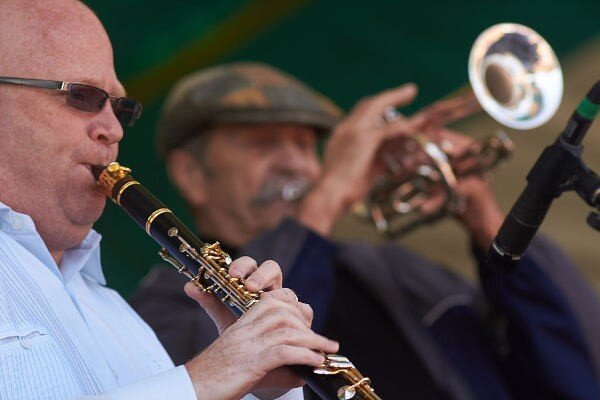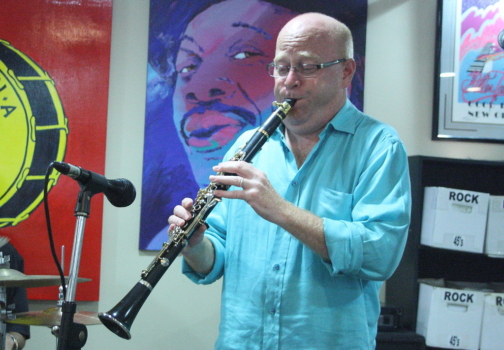Jazz interview with jazz clarinetist Tim Laughlin. An interview by email in writing.
JazzBluesNews.com: – First let’s start with where you grew up, and what got you interested in music?
Tim Laughlin: – I was born and raised in New Orleans. When I was I was 8, I had a childhood friend and neighbor who played the clarinet. He was quite accomplished. I would run down to his house and listen, watch and hold his music while he played. I eventually talked him into showing me how to play. He turned the mouthpiece around and showed me the proper armature. Shortly after, I convinced my parents I was interested in the clarinet. When I finally had one, I immediately started playing and practicing before my first private lesson. My friend gave me a head start.
JBN: – How did your sound evolve over time? What did you do to find and develop your sound?
TL: – Clarinetist Kenny Davern told me “the sound comes from your head.” You need to hear the note before you play it. Sure, you need the right marriage of reed, mouthpiece and horn but it’s still part of your musical DNA. Think of it in size, shape and color. I could play someone else’s clarinet and still get my sound. I mostly heard the great players on records and tried to match them using my ear. Eventually, your own sound comes out as you mature.
JBN: – What practice routine or exercise have you developed to maintain and improve your current musical ability especially pertaining to rhythm?
TL: – For some reason, I no longer practice with a method book. I practice songs. Songs I enjoy, songs I want to learn. Ultimately, I practice ideas. Having fast chops is good but telling a story well is more important. I listen a lot. Listening is practicing, as well.
JBN: – How to prevent disparate influences from coloring what you’re doing?
TL: – I don’t think avoiding influences while performing is possible. Influences are a part of you. Think about how we learn to speak. First from our parents, then from our teachers. Your own voice and timbre will eventually come out. Your sound and phrasing are your fingerprint and identity.
JBN: – How do you prepare before your performances to help you maintain both spiritual and musical stamina?
TL: – I try to show up early. Whether it’s a new venue or a steady gig, I like to get the feel of the room. Being relaxed is my secret.
JBN: – Ism is culled from a variety of lives dates with various performers over the course of a few years. Did your sound evolve during that time? And how did you select the musicians who play on the album?
TL: – Performing with great players/storytellers does have an effect and influence on you. Cornetist Connie Jones is an excellent example. His tone was soft and sweet. I tried to match it in his front line. Before you even play a note in the studio, you need to hear the tune in your head. That helps you choose the right players. I chose pianist Steve Pistorius for three of the numbers we recorded because his style fit those specific tunes.
JBN: – What’s the balance in music between intellect and soul?
TL: – The intellect comes from years of practice. Soul comes from years of living, performing and lots of mistakes. I’m 57 and just starting to enjoy my playing, “live.” I’ve learned to use space, like a good speaker uses pauses. Commas and periods are important. Again, it’s part of good storytelling.
JBN: – There’s a two-way relationship between audience and artist; you’re okay with giving the people what they want?
TL: – The audience doesn’t know what they want until they hear it. That’s why they trust you. A musician, writer, or painter must honor his own talent and choices first or settle for mediocrity. Music is a lot like cooking. The ingredients must be fresh and the persons making it must cook with love. People gravitate and recognize a musician who honestly loves what he’s performing. The “big boys” play for the other musicians around him.
JBN: – Please any memories from gigs, jams, open acts and studio sessions which you’d like to share with us?
TL: – I was hired by a producer of an IMAX film production to perform live clarinet clips taken from a synthesized clarinet part. I had to listen to the fake clarinet parts and humanize them. They were short little vignettes, but I had a ball listening, transcribing and playing them in my style. To this day, it’s still my favorite and most relaxed session.
JBN: – How can we get young people interested in jazz when most of the standard tunes are half a century old?
TL: – It helps if they see younger people performing (traditional) jazz. Unfortunately, young people want to be different, just like all their friends. In my case, I didn’t rebel against my parents. I rebelled against my generation. There are some kids out there with the same mindset. They just need to see it from another young person to validate it. It really is new music to them.
JBN: – John Coltrane said that music was his spirit. How do you understand the spirit and the meaning of life?
TL: – Jazz is about the moment and living in it. Everything you do, say and play means something. Believe it or not, it shapes the world and affects people, so you have a choice. How you convey these choices reveals your spirit.
JBN: – If you could change one thing in the musical world and it would become a reality, what would that be?
TL: – Eliminate pitch correction software. That should weed them out.
JBN: – Who do you find yourself listening to these days?
TL: – Sidney Bechet, Bob Wilber, Kenny Davern , Irving Fazola, Sir Charles Thompson & Chopin.
JBN: – What is the message you choose to bring through your music?
TL: – The music I play is timeless. It’s not old or dated if you’ve never been exposed to it.
JBN: – Let’s take a trip with a time machine, so where and why would you really wanna go?
TL: – Tie. 1923, Chicago. I’d want to hear Armstrong with King Olivers Band live. Same with 1936’s, to hear Irving Fazola’s clarinet sound with Bob Crosby’s Bobcats.
JBN: – I have been asking you so far, now may I have a question from yourself…
TL: – What is your definition of traditional jazz and what date would consider it to be at it’s apex?
JBN: – Jazz is my life and I like mainstream jazz, but don’t your “music”…
JBN: – So putting that all together, how are you able to harness that now?
TL: – Not sure I understand the question.
Interview by Simon Sargsyan







More Stories
Interview with Janis Siegel of The Manhattan Transfer: Jazz, being a more refined, interpreted form of music
CD review: George Benson – Dreams Do Come True: When George Benson Meets Robert Farnon – 2024: Video, CD cover
The band was tight as ever. The Warren Haynes Band cuts loose: Video, Photos